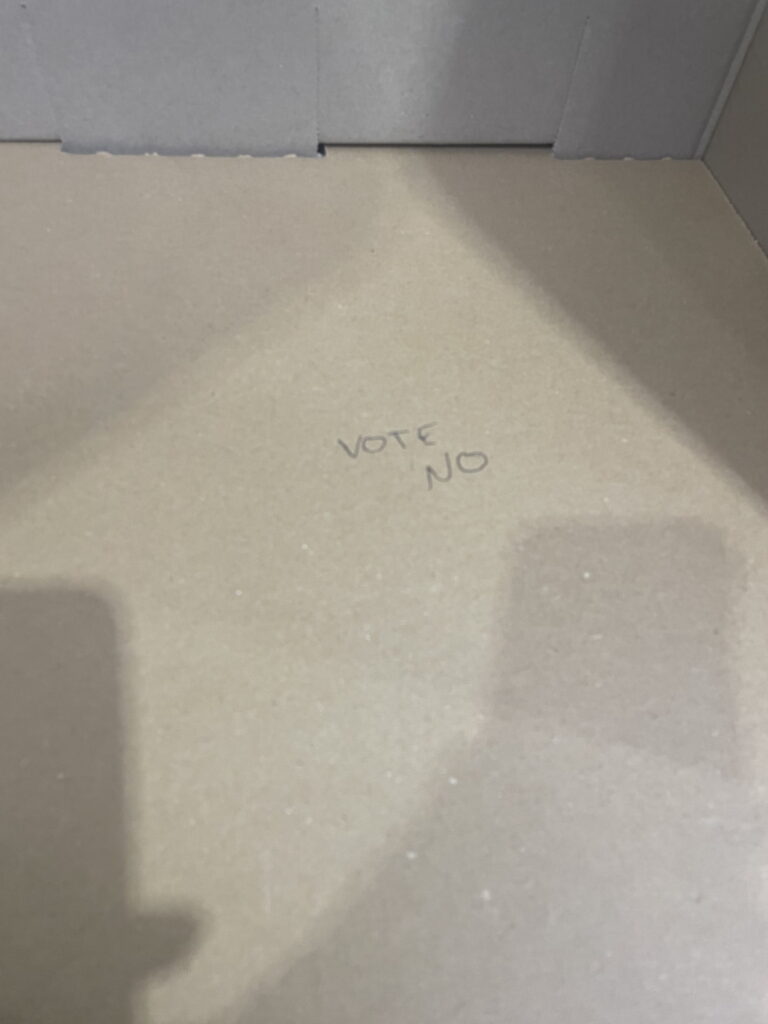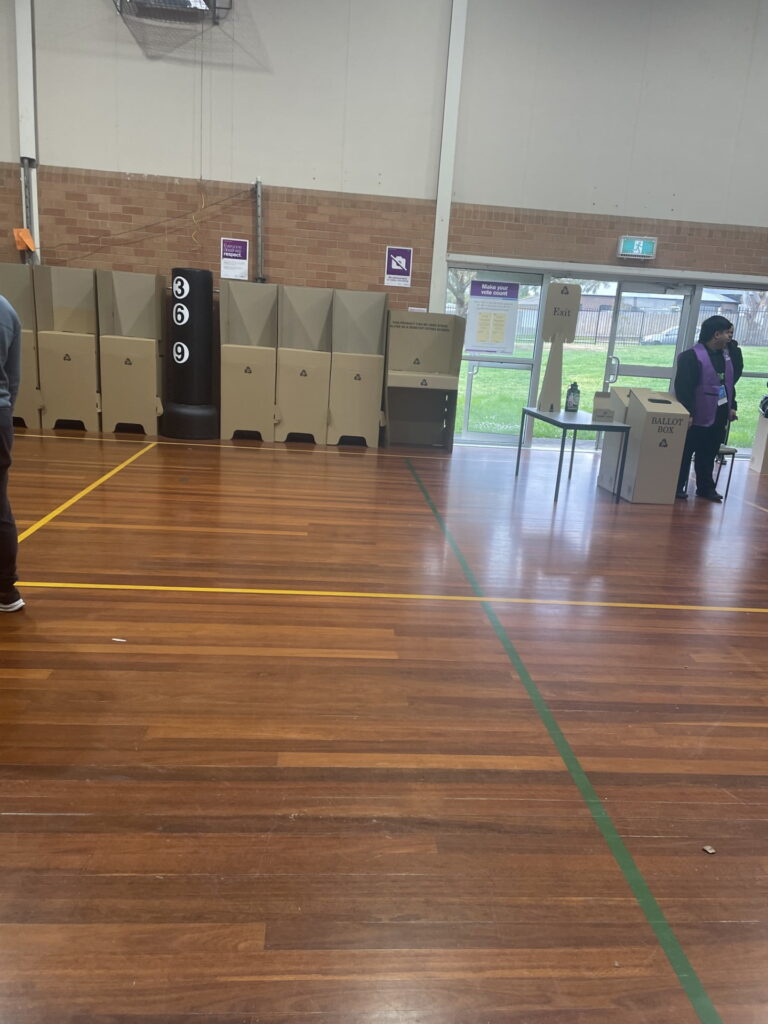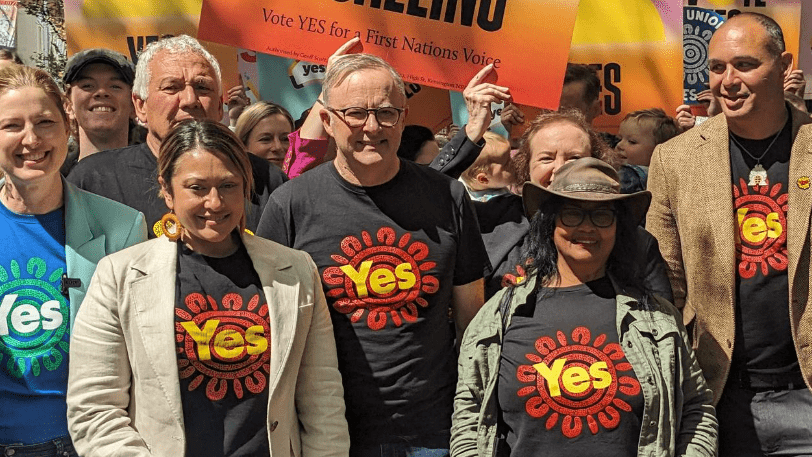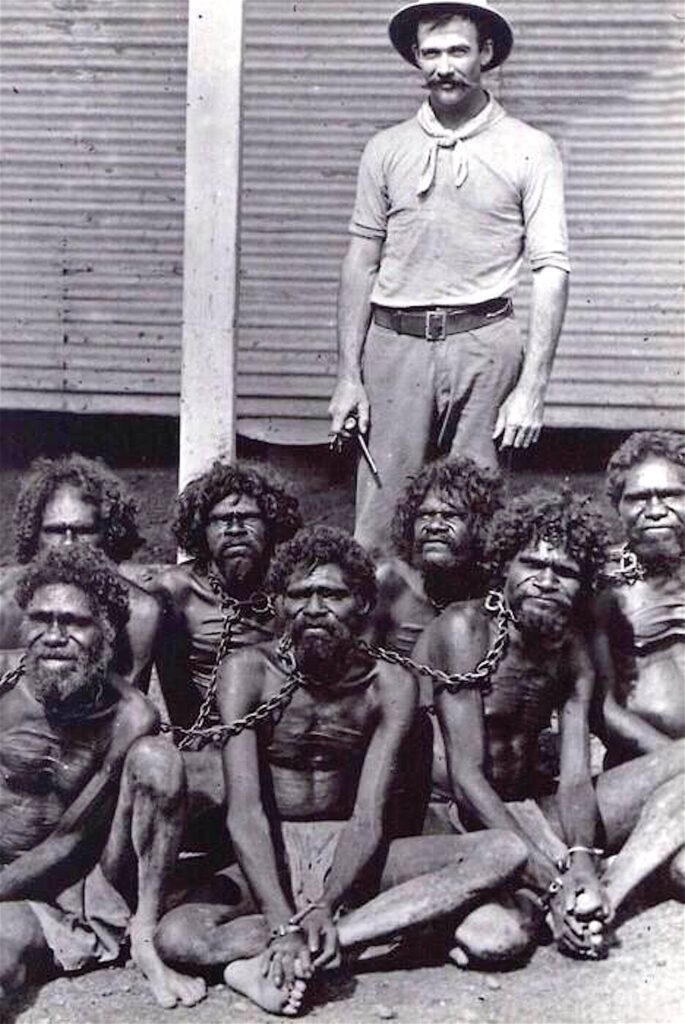Overzealous “No” campaigners in Australia have taken an active stance by targeting polling booths and attempting to influence voters by scrawling “Vote No” across voting stations.
One incident unfolded in the early hours of Saturday morning at Coral Park Primary School in Melbourne’s southeast in Victoria, where an irate “No” campaigner engaged with “Yes” volunteers before venturing inside to plaster “Vote No” messages all over cardboard boxes. A “Yes” volunteer, who was accosted by the aggressive activist, shrugged off the incident, telling BACKCOVERNEWS.COM, “It’s okay, everyone has the right to vote. I don’t take these things too personally.”

Aggressive “No” campaigners targeted polling booths early Saturday morning by scrawling “Vote no” across polling stations. Credit: Supplied. 
Aggressive “No” campaigners targeted polling booths early Saturday morning by scrawling “Vote no” across polling stations. Credit: Supplied.
This incident follows recent controversy surrounding the “Yes” campaign’s use of pushy text messages to sway voters in the final push before Saturday’s referendum. The messages, which strongly encourage voters to cast their ballots for the “Yes” campaign, sparked criticism for their perceived attempt to manipulate opinions.
The controversial text message reads: “Indigenous Australians want a Voice because when governments listen to people, they make better decisions and get better results. Vote Yes.” Accompanied by a link to a YouTube video posted by the Australian Labor Party, the message left some recipients feeling pressured to vote in favour of the “Yes” campaign.
The allegations surrounding these tactics have ignited a passionate debate about the ethical implications of such messaging in the lead-up to a significant referendum. Critics argue that this form of voter messaging, which overtly promotes one side of the debate, undermines the democratic process by influencing voters’ choices. They stress the need for impartiality and transparency in referendum campaigns to ensure the public can make informed decisions based on their own convictions.
The involvement of the government in disseminating these messages has raised concerns about its role in shaping the outcome of the referendum. The independence and neutrality of the referendum process are vital for its legitimacy and public trust. Accusations of spamming voters with biased messages could erode this trust and compromise the integrity of the vote.

As the debate surrounding these text messages escalates, it underscores the importance of maintaining the integrity of the referendum process and ensuring that voters are provided with unbiased information to make their choices. These allegations serve as a stark reminder of the need for ethical campaign practices and a fair and transparent approach to conducting referendums of national significance.
Early voting, which commenced on October 2, has seen more than 4 million people exercise their right to cast their ballots.
With the countdown to the October 14 voting day drawing nearer, the opposition to the proposal has gained prominence within the ‘Yes’ camp. According to the latest YouGov poll released on Thursday, the ‘Yes’ campaign holds 56% of the vote, with the ‘No’ camp trailing at 38%. Notably, 6% of respondents remained undecided in their stance. YouGov conducted this survey by polling 1,519 voters.
This rapid development and the heated campaigns emphasize the importance of ensuring a fair and transparent voting process, where every voter can make an informed decision, free from undue influence. It remains to be seen how these controversies will impact the final outcome of the referendum on October 14.
What is the 2023 Australian Indigenous Voice referendum?
The 2023 Australian Indigenous Voice referendum is a proposed constitutional amendment that seeks to establish an Indigenous Voice to Parliament. The referendum aims to address the historical underrepresentation of Indigenous Australians in the nation’s decision-making processes and empower Indigenous communities to have a more significant role in shaping policies, legislation, and broader political matters.
The key component of the referendum includes:
Voice to Parliament: The central element of the proposed reform is the creation of a constitutionally enshrined “Voice to Parliament.” This body would act as a representative entity for Indigenous peoples, allowing them to participate in discussions and decisions at the federal level. Importantly, the Voice would not possess legislative powers but would serve as an advisory body to Parliament. Its primary role is to ensure that Indigenous perspectives are taken into account in matters that affect their lives.
The referendum reflects a broader effort to foster reconciliation, address historical injustices, and provide Indigenous communities with the means to contribute to Australia’s democratic processes. It is expected to be a defining moment in the nation’s reconciliation journey, with the potential to reshape the democratic landscape by empowering Indigenous voices and ensuring their perspectives are considered in national decision-making.
However, the referendum is not without its challenges and controversies. Some critics argue that the proposed Voice does not confer enough legislative power, while others question the necessity of constitutional change. Securing bipartisan support and persuading the public of the referendum’s importance will be significant hurdles in the lead-up to the vote.
Ultimately, the 2023 Australian Indigenous Voice referendum represents a critical step in Australia’s journey towards Indigenous empowerment, truth-telling, and reconciliation. Its success could have a profound impact on the nation’s commitment to inclusivity, unity, and social justice.

